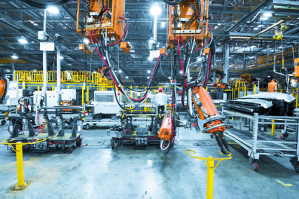From soap to cars and industrial gases, data is the way to deliver cost savings
Inflation, energy transition, and the climate emergency add up to some of the main challenges facing businesses today. The manufacturing supply chain is where these macroeconomic forces are most keenly felt. However, data is enabling leading organisations to not only transition their operations and products but also deliver significant savings and stem the impact of inflation. Consequently, these businesses are then able to invest in new forms of energy and cleaner operations.
Make decisions at the speed of change
Connect the dots between data, insights, and better business outcomes with end-to-end analytics.

The energy transition is perhaps most clearly seen in the automotive sector. Jaguar Land Rover, a maker of SUV and sports car vehicles, plans to have a completely electric vehicle portfolio across its brands by 2025 and for all of its products to produce zero emissions at the exhaust pipe a decade later in 2035. This is a complete transformation for the company, whose heritage is in large, high-powered petrol and diesel engines; not only this, Jaguar Land Rover says its supply chain and operations are to create zero emissions by 2039.
“The main cost in our production and distribution process is always energy and transport, so many of the analyses we carry out will optimise these two areas,” says Elena López, head of Enterprise Applications at Nippon Gases. Like Jaguar Land Rover, Nippon Gases makes complex products that use a great deal of energy in the manufacturing process and then require distribution. Making the business more ecological and financially sustainable is a major challenge.
Dr Johannes Holtbruegge, Senior Manager of Digital Transformation at Henkel Laundry & Home Care, a fast-moving consumer goods (FMCG) business, faces the same challenge as López. “The production of washing detergent powder is a crucial part of our business. It’s a very energy-intensive process, and the spray towers which turn liquid detergent into powder flakes are highly sensitive to even small fluctuations in temperature and humidity.”
Despite the differences in the products that Henkel, Jaguar Land Rover and Nippon Gases manufacture, all three businesses have joined up their data. This has connected the various business units together to create cost savings. “By analysing all of the variables that are involved and visualising these calculations, Tableau can give us an early warning before an incident such as overheating occurs,” says Jesús Gallego, European Director of the Operations Department at Nippon Gases.
Gallego adds: “The Operations department can make preventive decisions, helping to improve the availability and reliability of the production plant. Without Tableau, this could not be done because we had no way of visualising so much data. It is now also possible to gain a complete overview of all of the production stops that have occurred in plants, and as a result, the cause will sometimes lead to a technical bulletin being sent out to the other plants in order to prevent similar incidents”. Disruptions to the manufacturing process often lead to poor productivity and inefficiencies. Nippon Gases is now able to reduce these and see cost savings and improvements in its processes.
Jaguar Land Rover CEO Thierry Bolloré says: “Data is the backbone of new products, the lifecycle of existing products, the quality of our manufacturing, the oxygen of our supply chain, and the services we can provide to our customers in the future.”
Data reliability
These organisations are achieving cost efficiencies through a data-led strategy. Businesses can only become data-led when the data quality is as high as the products that roll off their manufacturing lines. “Like so many multinational organisations today, effective data reporting and analytics are critical to Henkel. When operating on such a large scale, even the smallest savings in areas like the supply chain can be worth millions of euros. The more accurate we can be with our data, the more likely we are to identify where such savings can be made,” says Dr Holtbruegge.
Henkel, which adopted Tableau in 2016, used a business-wide data integration programme to ensure data quality would meet the needs of the business. “We first started connecting our factories worldwide to a central data repository in 2013… and we realised how much of our data we could centralise in one place and the value it could bring in terms of increasing efficiency and identifying cost savings. We now have all of our supply chain data consolidated through Tableau from a range of sources, including Dremio, Oracle, Excel Cubes and more,” he says.
“If changes occur in consumption patterns, the update is automatically reflected in the analysis, allowing for improvement in the service provided to customers and ensuring a continued, reliable supply of gas in line with their needs,” says Gallego at Nippon Gases. A centralised data approach brings the business closer to the customer and their requirements.
While at Henkel, the business is using weather data to make the production of washing detergent powder more efficient. “If conditions are too hot or too humid, efficiency can be severely affected. However, using Tableau, we were able to correlate local weather data against our tower operating schedule, ensuring production was maximised at times when the atmospheric conditions were optimal. Doing so has helped to boost production energy efficiency by as much as 5%.”
Data delivered savings
All three businesses have produced significant cost savings from their data strategies. “In 2019 alone, we identified energy and cost savings worth €4 million,” says Dr Holtbruegge. He says this efficiency is a: “direct result of better data visibility and transparency.”
“We’ve also been able to reduce energy consumption across our Laundry & Home Care global supply chain by 20% and improve the efficiency of our factories by over 10% since 2013.” Along the way, Henkel has been named an Advanced Fourth Industrial Revolution Lighthouse by the World Economic Forum for its innovation, and a culture of healthy competition exists between all of the Henkel global factories to be the most energy-efficient.
Jaguar Land Rover has seen a similar level of global collaboration. The car manufacturer launched an Analytics Centre of Excellence in 2017, which has delivered £200 million in value to the business through data-driven decision-making. Having seen the efficiencies, Jaguar Land Rover created InDigital, a new digital centre of excellence in 2021, which has the task of creating £250 million in business value from data and digital methods.
Learn more about how HLS organisations are building more resilient supply chains with Tableau and Augmented Analytics with our on-demand webinar.
Automate analysis on all your data
Visualize and explore all of your data to get automated insights for your entire organisation.

























